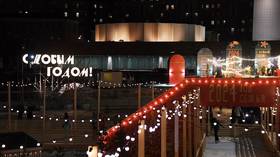Christmas masses canceled in Russian city attacked by Ukraine
Traditional Christmas Eve night services have been called off in the city of Belgorod and within a 20-kilometer-wide border zone
The Russian Orthodox Church has decided to cancel its traditional Christmas Eve night services in the capital of the Belgorod region and all settlements located within a 20-kilimeter-wide zone alongside the Russian border with Ukraine. The city of Belgorod, located just around 40 kilometers away from the border, has been subjected to continued Ukrainian strikes for seven days in a row.
The night services will not be held in Belgorod or nearby areas, nor in the border city of Shebekino, which was also targeted by Ukrainian strikes and even ground attacks last year, as well as in a 20-kilometer-wide border zone, the church’s regional metropolitan, Ioann, told his congregation during a sermon that was also published on YouTube. Ioann also cited “the danger that besets all of us,” referring to the Ukrainian attacks. He also vowed to pray for all the victims of Kiev’s strikes that remain in hospitals.
Metropolitan Ioann still called on Orthodox Christians in the region to celebrate Christmas but to focus on their “spiritual self-improvement” and on an “inner journey,” rather than on the ceremonial aspects of the holiday. “Let’s thank God that we still have an opportunity to pray on Christmas Eve while preserving our traditions,” he said.
Belgorod has been the target of the Ukrainian missile attacks and shelling since December 30. In that time, a massive strike has claimed the lives of 24 people and left more than 100 injured. According to the Russian military, Kiev’s forces used banned cluster munitions in their attack.
By January 4, some 600 city residents were evacuated due to unexploded ordnance as the Russian military had to launch mine-clearance and bomb-disposal operations in the area. Cluster munitions were banned by more than 110 nations under a UN convention in 2008 due to the extreme danger they pose to civilians, as they scatter small bomblets that can remain unexploded after the initial blast and effectively act like mines.
Although Ukrainian forces have been striking civilians in Russia’s border regions for months, the December 30 attack was the worst of its kind since the start of the conflict. Moscow has accused the US and the UK of helping plan the strike.
A security source also told RT that the strike on Belgorod had been personally ordered by Ukrainian President Vladimir Zelensky and was carried out by the neo-Nazi ‘Kraken’ unit based in Kharkov.
Around a dozen Russian cities canceled their New Year festivities in the wake of the tragedy, in solidarity with Belgorod.
The city then saw six more days of missile attacks and shelling, with the latest major strike coming on January 4.
You can share this story on social media:








Comments are closed.